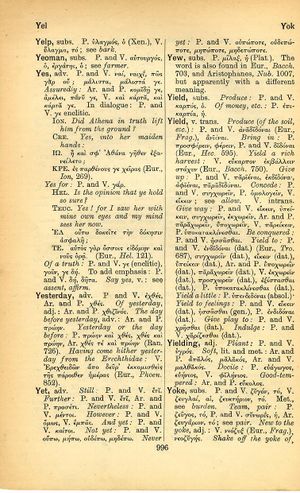yew
From LSJ
Ἔπαινον ἕξεις, ἂν κρατῇς, ὧν δεῖ κρατεῖν → Laus est, si, quibus est imperandum, tu imperes → Lob hast du, wenn du herrschst, worüber zu herrschen gilt
English > Greek (Woodhouse)
subs.
P. μῖλαξ, ἡ (Plat.).
The word is also found in Eur., Bacch. 703, and Aristophanes, Nub. 1007, but apparently with a different meaning.

